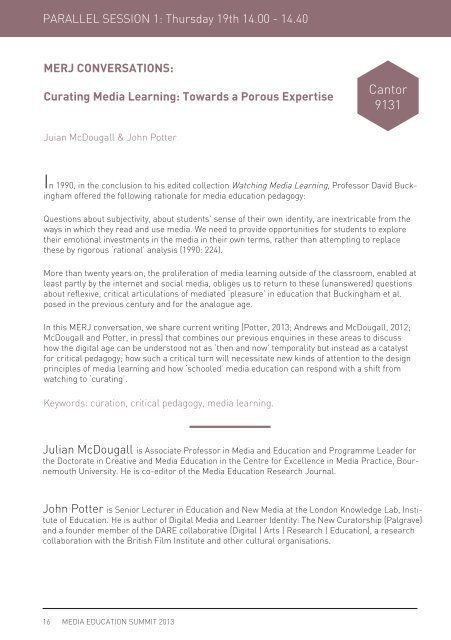2013 Summit Programme - The Centre for Excellence in Media ...
2013 Summit Programme - The Centre for Excellence in Media ...
2013 Summit Programme - The Centre for Excellence in Media ...
You also want an ePaper? Increase the reach of your titles
YUMPU automatically turns print PDFs into web optimized ePapers that Google loves.
PARALLEL SESSION 1: Thursday 19th 14.00 - 14.40<br />
MERJ CONVERSATIONS:<br />
Curat<strong>in</strong>g <strong>Media</strong> Learn<strong>in</strong>g: Towards a Porous Expertise<br />
Cantor<br />
9131<br />
Juian McDougall & John Potter<br />
In 1990, <strong>in</strong> the conclusion to his edited collection Watch<strong>in</strong>g <strong>Media</strong> Learn<strong>in</strong>g, Professor David Buck<strong>in</strong>gham<br />
offered the follow<strong>in</strong>g rationale <strong>for</strong> media education pedagogy:<br />
Questions about subjectivity, about students’ sense of their own identity, are <strong>in</strong>extricable from the<br />
ways <strong>in</strong> which they read and use media. We need to provide opportunities <strong>for</strong> students to explore<br />
their emotional <strong>in</strong>vestments <strong>in</strong> the media <strong>in</strong> their own terms, rather than attempt<strong>in</strong>g to replace<br />
these by rigorous ‘rational’ analysis (1990: 224).<br />
More than twenty years on, the proliferation of media learn<strong>in</strong>g outside of the classroom, enabled at<br />
least partly by the <strong>in</strong>ternet and social media, obliges us to return to these (unanswered) questions<br />
about reflexive, critical articulations of mediated ‘pleasure’ <strong>in</strong> education that Buck<strong>in</strong>gham et al.<br />
posed <strong>in</strong> the previous century and <strong>for</strong> the analogue age.<br />
In this MERJ conversation, we share current writ<strong>in</strong>g (Potter, <strong>2013</strong>; Andrews and McDougall, 2012;<br />
McDougall and Potter, <strong>in</strong> press) that comb<strong>in</strong>es our previous enquiries <strong>in</strong> these areas to discuss<br />
how the digital age can be understood not as ‘then and now’ temporality but <strong>in</strong>stead as a catalyst<br />
<strong>for</strong> critical pedagogy; how such a critical turn will necessitate new k<strong>in</strong>ds of attention to the design<br />
pr<strong>in</strong>ciples of media learn<strong>in</strong>g and how ‘schooled’ media education can respond with a shift from<br />
watch<strong>in</strong>g to ‘curat<strong>in</strong>g’.<br />
Keywords: curation, critical pedagogy, media learn<strong>in</strong>g.<br />
Julian McDougall is Associate Professor <strong>in</strong> <strong>Media</strong> and Education and <strong>Programme</strong> Leader <strong>for</strong><br />
the Doctorate <strong>in</strong> Creative and <strong>Media</strong> Education <strong>in</strong> the <strong>Centre</strong> <strong>for</strong> <strong>Excellence</strong> <strong>in</strong> <strong>Media</strong> Practice, Bournemouth<br />
University. He is co-editor of the <strong>Media</strong> Education Research Journal.<br />
John Potter is Senior Lecturer <strong>in</strong> Education and New <strong>Media</strong> at the London Knowledge Lab, Institute<br />
of Education. He is author of Digital <strong>Media</strong> and Learner Identity: <strong>The</strong> New Curatorship (Palgrave)<br />
and a founder member of the DARE collaborative (Digital | Arts | Research | Education), a research<br />
collaboration with the British Film Institute and other cultural organisations.<br />
16 <strong>Media</strong> Education <strong>Summit</strong> <strong>2013</strong>


